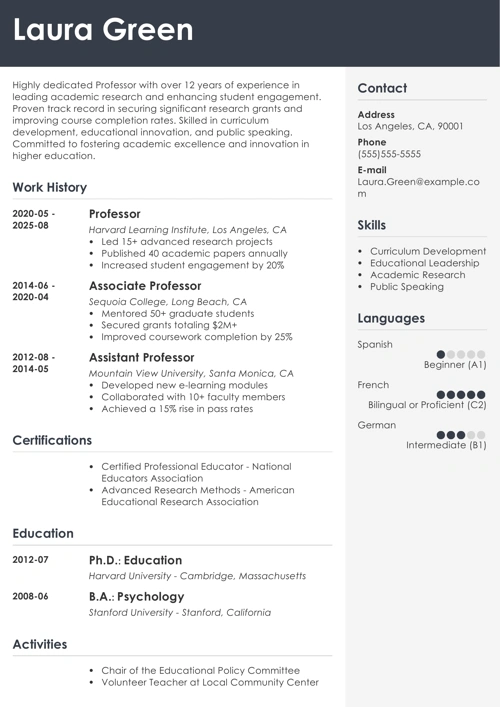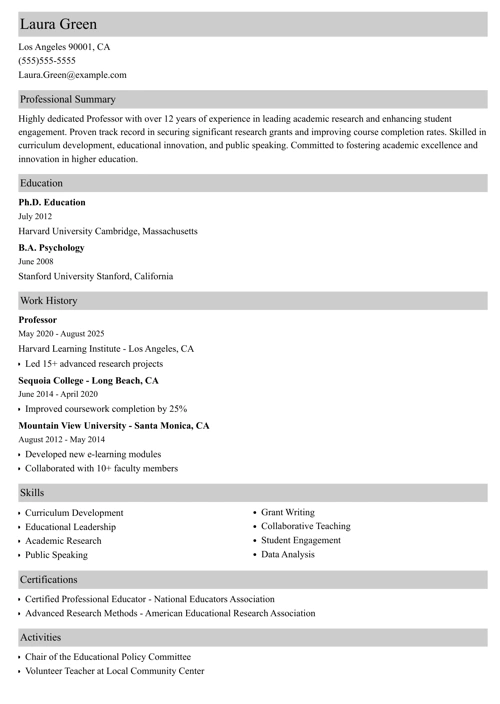After years of shaping some of the brightest minds, you've decided it’s time for a career change. It can be both thrilling and intimidating, but you can make the transition smoother with the right outlook and a well-written professor resume.
Concerned about transforming your academic accomplishments into something more universally relatable? Don’t worry, professor—we’re here to help with everything you need, from professor resume examples to tips for crafting top-notch professor resumes. Let's get started!
This guide will show you:
- A professor resume template that’s better than 9 out of 10 other resumes.
- How to write a professor resume that will land you more interviews.
- Tips and examples of how to put skills and achievements on a professor's resume.
- How to describe your experience on a resume for a professor to get any job you want.
Want to save time and have your resume ready in 5 minutes? Try our resume builder. It’s fast and easy to use. Plus, you’ll get ready-made content to add with one click. See 20+ resume templates and create your resume here.
Sample resume made with our builder—See more resume examples here.
One of our users, Brittanya, had this to say:
Zety really helped me create the best resume possible. It pointed out how things could be better on my existing resume and suggested many things to be re-worded or removed.
Need academic resume examples or other resume advice? Check out our other guides:
- Research Assistant Resume
- Teacher Resume
- Tutor Resume
- Writer Resume
- Professor CV
- Academic CV
- PhD Resume
- Scholarship Resume
- Environmental Science Resume
- The Best Resume Examples for All Jobs
Professor Resume Template
Dr. Laura L. Green
Research and Training Specialist
(555) 987-6543
lauralgreen@email.com
linkedin.com/in/laura-l-green
Objective
Analytical and results-oriented professional with 12+ years of experience as a Professor of Psychology, specializing in research, data analysis, and training. Skilled in project management, team collaboration, and evidence-based decision-making. Eager to leverage academic expertise and strong communication skills to drive impactful research and training initiatives at Insight Research Group.
Experience
Professor of Psychology
Central State University, Columbus, OH
August 2012–November 2024
Key Qualifications & Responsibilities
- Conducted and published extensive research on behavioral psychology, contributing findings that informed educational and therapeutic practices.
- Designed and led training workshops for students and professionals, focusing on data-driven methods for analyzing human behavior.
- Collaborated with interdisciplinary teams on grant-funded projects, ensuring timely project completion and compliance with funding requirements.
- Analyzed large datasets, applying statistical techniques to draw actionable insights for academic and organizational purposes.
Key Achievement:
- Led a research initiative that resulted in a 20% increase in student engagement in university-wide mental health programs, recognized by the Department of Education.
Research Consultant (Part-Time)
Behavioral Insights Consulting, Columbus, OH
January 2020–October 2024
Key Qualifications & Responsibilities
- Provided consulting services to organizations seeking to understand and improve employee engagement and customer behavior.
- Developed surveys and assessment tools to collect data on workplace satisfaction, analyzed results, and presented findings to senior management.
- Collaborated with clients to create action plans based on research insights, leading to measurable improvements in organizational performance.
Key Achievement:
- Designed a client satisfaction survey that identified key areas for improvement, resulting in a 25% increase in customer retention for the consulting firm.
Education
Ph.D. in Psychology
University of Chicago, Chicago, IL
September 2008–May 2012
Master of Arts in Psychology
University of Chicago, Chicago, IL
September 2006–May 2008
Bachelor of Science in Psychology
Ohio State University, Columbus, OH
September 2002–May 2006
Skills
- Quantitative & Qualitative Data Analysis
- Survey Design & Assessment
- Project Management
- Report Writing & Presentation
- Training & Workshop Facilitation
- Cross-Functional Team Collaboration
- Evidence-Based Decision Making
- Client Consultation
Certifications
- Project Management Professional (PMP), 2022
- Certified Behavioral Consultant, 2020
Languages
- English—Native
- Spanish—Conversational
Here’s how to write your own professor resume:
1. Format Your Professor Resume Template Correctly
Your professor's resume should reflect the depth and breadth of your career but with an eye toward translating academic achievements into strengths that resonate outside academia. Non-academic roles are competitive, so your resume must make a strong first impression. What catches an employer’s attention? A clear, well-organized resume format that highlights your transferable skills and accomplishments effectively.
To format your professor's resume:
- Begin with a resume header. Include your name, phone number, email, LinkedIn profile, and any relevant online portfolio. These are essential contact details for a resume.
- It's okay to omit your street address but mention your city if it aligns with the institution's location.
- Opt for a reverse-chronological resume, listing your most recent role first. This is the preferred resume layout as it aligns with hiring expectations.
- Choose a professional font, such as Calibri or Arial, with a size between 10 and 12 points. The ideal font size for resumes ensures readability.
- Save your resume as a PDF file named “Your Name - Professor - Resume.pdf”. A PDF format ensures the document retains its layout across different devices.
- The recommended resume length for professors is typically one page, but those with extensive experience may use two pages.
Read more: Effective and Simple Resume Templates
2. Customize Your Professor's Job Description for a Resume
Understanding how to tailor a resume to a specific job is crucial. Generic resume experience sections often fail to impress. If a hiring manager simply sees a list of duties, they might wonder about your actual impact in those roles.
Here's how to add relevant experience to your resume:
- Match the job title used in the job posting for optimal resume ATS compatibility.
- Following the organization's name and your employment dates, include 3–6 resume bullet points detailing your achievements and responsibilities.
- Highlight your accomplishments by integrating quantifiable results and key performance indicators. Refer to the best achievements to put on a resume.
- Use resume action verbs like developed, implemented, and enhanced to start each bullet point.
Professor Resume Examples: Sample Responsibilities
- Design and deliver engaging lectures and seminars in accordance with curriculum guidelines.
- Conduct innovative research and publish findings in reputable academic journals.
- Mentor and advise undergraduate and graduate students on academic and career development.
- Develop and update course materials to reflect current trends and advancements in the field.
- Collaborate with colleagues to enhance departmental initiatives and interdisciplinary projects.
- Secure research funding through grant proposals and partnerships with industry stakeholders.
- Participate in faculty committees to contribute to university governance and policy-making.
Remember to use action verbs that convey your responsibilities and achievements effectively. Here are some action verbs for professor resumes:
Professor Resume Examples: Action Verbs
- Conducted
- Developed
- Mentored
- Published
- Collaborated
- Innovated
- Secured
- Lectured
- Evaluated
- Facilitated
Read more: The Best ‘Responsible’ Synonyms for Resumes
3. Make Your Education Section Count
Everyone includes their educational background on a resume, but stopping at just the degree title, university name, and dates is a missed opportunity. That's like using MatLab only for basic calculations. Highlighting your education to demonstrate additional skills can significantly increase your interview opportunities.
Check out these resume tips:
- The optimal resume degree placement is directly after your work history.
- For entry-level positions, add relevant coursework to showcase your skills.
- Even in an experienced resume, include bullet points if you received a fellowship, scholarship, or held a leadership role.
- Should you include your GPA on a resume? If it's exceptionally high, go for it.
Read more: The Best Career Change Ideas & Tips
Creating a resume with our builder is incredibly simple. Follow our step-by-step guide and use content from Certified Professional Resume Writers to have a resume ready in minutes.
When you’re done, Zety’s resume builder will score your resume and our resume checker will tell you exactly how to make it better.
4. Highlight Relevant Skills on Your Professor Resume
You need skills on a resume, but there’s a strategic way to present them. Instead of listing skills randomly, target the key abilities mentioned in the job posting.
Here's how to incorporate relevant professor skills into your resume:
- The skills highlighted in the job ad are your resume keywords. Ensure they appear in your skills list.
- Avoid overwhelming the reader with too many hard and soft skills. Focus on the most critical ones to prevent them from getting lost.
- For maximum impact, include these skills in your job descriptions and education sections.
When writing a career change resume, it’s crucial to focus on transferable skills. For inspiration, check out the sample professor resume skills list below:
Sample Skills for Professor Resumes
- Curriculum Development
- Research Methodology
- Academic Writing
- Public Speaking
- Peer Review
- Data Analysis
- Grant Writing
- Educational Technology
- Critical Thinking
- Teamwork Skills
- Leadership Skills
- Conflict Resolution
- Communication Skills
- Time Management
- Adaptability
- Interpersonal Skills
- Organizational Skills
- Problem-Solving Skills
- Mentoring
- Project Management Skills
Read more: Top Resume Skills: Zety US Study Findings
5. Add Other Sections to Your Professor Resume
While a strong resume forms the foundation, it's often the extra resume sections that capture a hiring manager's attention and reveal your true potential. These additions can highlight your energy, dedication, and the unique qualities that make you a perfect candidate.
Consider incorporating these additional elements to enhance your professor resume:
- Include relevant certifications that emphasize your expertise.
- Showcase your thought leadership by listing publications in respected academic journals or conferences.
- Memberships in professional associations can underscore your engagement with the academic community.
- Highlight any volunteer work that demonstrates your commitment to education or community service.
- Language proficiency can be a significant asset, especially in companies operating internationally.
Read more: Thank You Email After a Job Interview: Examples & Expert Advice
6. Write a Professor Resume Summary or Resume Objective
Hiring managers often skim resumes quickly, spending just 7 seconds on each. Make your resume stand out with a resume introduction that captures their interest right away.
This section is known as a resume profile or sometimes referred to as an elevator pitch of yourself. Aim to convey your value in a succinct paragraph.
If you’ve got two or more years of experience in the job you’re applying for, include your job title, how you can contribute to the company, and a few noteworthy accomplishments. This is your resume summary and should be placed at the top of your resume.
As a professor with "no real working experience," outside of the world of academia, a resume objective may be a better choice. It emphasizes the skills you've developed, skips over unrelated accolades, and demonstrates how you’ll contribute to the goals of your next role.
Read more: How to Talk About Yourself in an Interview [Plus Examples]
7. Write a Cover Letter for Your Professor's Resume
In today's competitive job market, a well-crafted cover letter is essential. It distinguishes you from other candidates who may simply send out generic resumes. A personalized cover letter shows your genuine interest in the position and the company
To create an effective cover letter:
- Start with a professional cover letter format, mirroring the header of your resume and concluding with a formal sign-off.
- Keep it concise, ideally within three to five paragraphs and under one page.
- Begin by mentioning the job title and include a compelling cover letter opening that grabs attention.
- In the body, highlight major achievements that align with the role.
- Conclude with a strong cover letter closing statement that reiterates your skills and expresses your desire for further discussion.
- Follow up with a brief email weekly for a month, attaching your resume and cover letter.
Read more: Writing a Cover Letter for a Job: Tips & Examples
Plus, a great cover letter that matches your resume will give you an advantage over other candidates. You can write it in our cover letter builder here. Here's what it may look like:
See more cover letter templates and start writing.
About Zety’s Editorial Process
This article has been reviewed by our editorial team to make sure it follows Zety's editorial guidelines. We’re committed to sharing our expertise and giving you trustworthy career advice tailored to your needs. High-quality content is what brings over 40 million readers to our site every year. But we don't stop there. Our team conducts original research to understand the job market better, and we pride ourselves on being quoted by top universities and prime media outlets from around the world.





